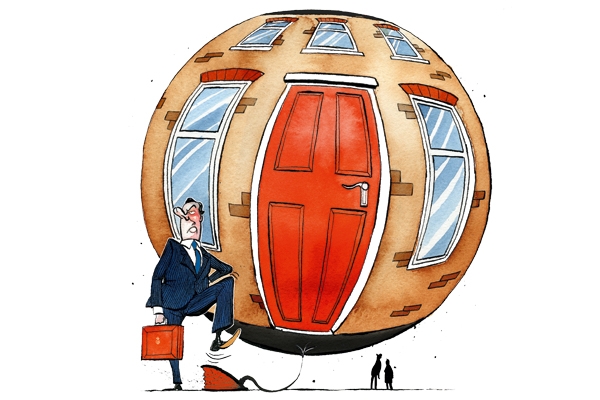Even the evening BBC bulletins are leading with this morning’s announcement by George Osborne that he will extend his ‘pensioner bonds’ programme – a glorified way of giving pre-election bungs to the over-65s. This is Osborne’s answer to Gordon Brown’s bribe, the ‘winter fuel payment’ (the word ‘fuel’ being redundant). When elections grow near, governments bribe pensioners because the pensioners are most likely to vote.
The Chancellor told Andrew Marr today (pdf) that ‘backing savers is part of our long-term plan’. The opposite is true. Screwing savers is part of his long-term economic plan: an unintentional but inevitable consequence of his screwing interest rates as low as he can for as long as possible. And it is certainly long term, he got that bit right. As the Bank of England’s chief economist recently pointed out, the market currently expects negative real interest rates for the next 40 years (see graph, below – an unusual one, but an important one). So why save? Low interest rates transfer money from savers to borrowers – and the no1 borrower in Britain is HM Treasury.
Sometimes, I despair of Osborne. He seems drawn to half-truths like a moth to the flame, as if he’s trying to dare himself to see how much nonsense he can get away with spouting on national television. “This government backs savers, supports people who do the right thing and is fixing what went wrong in our economy,” he says – really? Does it back savers? Because the Money pages of the Sunday newspapers have provided unrelenting bad news for savers under his time in office – as any saver will have noticed. Cash ISAs now look like a tax on hope, penalising those who think the government will ever want to return to a normal interest rate environment.
[datawrapper chart=”http://static.spectator.co.uk/bP0N3/index.html”]
Anyone gullible enough to put £1,000 put in a cash ISA in Jan 2008 would see it worth £898 now, if you adjust for inflation. In what way does this represent savers being looked after by this government?
The truth is that savers have been collateral damage in this government’s recovery plan. The Coalition, like the Labour government before it, had to choose: help borrowers (low rates) or savers (normal rates) and went for the former. Perhaps rightly, but let’s not pretend the choice was not made – or that you can help one with hurting the other. There was QE, which hit pension funds, and then Osborne’s Funding-for-Lending scheme. His Treasury gave cheap loans directly to banks, so they didn’t need to borrow from the public as much – so lowered saving rates even further.
The annoying thing is that Osborne has plenty of true things that he can boast about: record jobs, quality of jobs, how his tax cuts made business more competitive, low inflation, supermarket price wars – the list goes on. If I were him, I’d make more about mortgages being at a record low: he has favoured borrowers during his time at the Treasury and my as well draw political capital from this (see chart, below).
[datawrapper chart=”http://static.spectator.co.uk/6SiI9/index.html”]
But no, being Osborne, he has to try to find ways to boast about his failures: the deficit, savers. Which is annoying because the list of what he has got right as Chancellor is way longer than what he got wrong. The sooner he gets off the subject of the latter, the better.







Comments